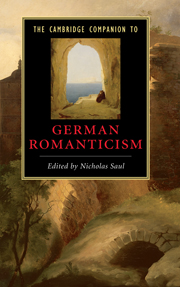Book contents
- Frontmatter
- 1 What is Romanticism, and where did it come from?
- 2 From early to late Romanticism
- 3 Prose fiction of the German Romantics
- 4 The Romantic lyric
- 5 The Romantic drama
- 6 Forms and objectives of Romantic criticism
- 7 Romanticism and Classicism
- 8 Women writers and Romanticism
- 9 The Romantics and other cultures
- 10 Love, death and Liebestod in German Romanticism
- 11 Romantic philosophy and religion
- 12 Romantic politics and society
- 13 Romantic science and psychology
- 14 German Romantic painters
- 15 Romanticism and music
- 16 Transformations of German Romanticism 1830-2000
- Key authors and their works
- Further reading
- Index
12 - Romantic politics and society
Published online by Cambridge University Press: 28 September 2010
- Frontmatter
- 1 What is Romanticism, and where did it come from?
- 2 From early to late Romanticism
- 3 Prose fiction of the German Romantics
- 4 The Romantic lyric
- 5 The Romantic drama
- 6 Forms and objectives of Romantic criticism
- 7 Romanticism and Classicism
- 8 Women writers and Romanticism
- 9 The Romantics and other cultures
- 10 Love, death and Liebestod in German Romanticism
- 11 Romantic philosophy and religion
- 12 Romantic politics and society
- 13 Romantic science and psychology
- 14 German Romantic painters
- 15 Romanticism and music
- 16 Transformations of German Romanticism 1830-2000
- Key authors and their works
- Further reading
- Index
Summary
'Die Französische Revolution, Fichtes Wissenschaftslehre, und Goethes Meister sind die gröBten Tendenzen des Zeitalters' ('The French Revolution, Fichte's Theory of Knowledge, and Goethe's Wilhelm Meister are the three greatest tendencies of the age'), Friedrich Schlegel remarks in a famous Fragment (No. 216) published in Athenaeum in 1798. According to Schlegel, it was but a small step from the mass revolt in France to the treatise of a German professor and then to the latest novel of a bestselling author. But in this unusual juxtaposition of events, which followed both on and from each other, the Revolution, en route to Germany, went politically adrift. The event was repeated on paper, in books designed to educate readers rather than in actions dethroning monarchs. These writings, as we shall see, shifted the uprising from politics to philosophy and literature. Many authors of the Romantic generation - poets and philosophers as well as publishers, literary critics and political thinkers - followed the same path around 1800. The events in France, which most of them, like Schlegel himself, knew only at second hand through newspapers, books and word of mouth, provided both an impetus and an object of criticism for their political thought. Sobered by the increasingly radical 'tendencies' of the revolutionaries and the dramatic escalation of the Revolution, the authors engaged in a heated debate about the notions of state and society, nation and Volk. In theoretical sketches and practical experiments, they developed models designed to be understood not only as more convincing alternatives to the French revolutionary state, but also as counter-concepts drawing their social meaning from home-grown traditions.
- Type
- Chapter
- Information
- The Cambridge Companion to German Romanticism , pp. 191 - 208Publisher: Cambridge University PressPrint publication year: 2009
- 1
- Cited by

